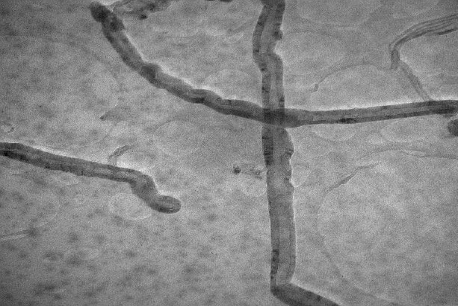Go to
June 17, 2008
Biomolecular Hybrid Devices
Lalit M Bharadwaj, Central Scientific Instruments Organisation, Chandigarh, India
Abstract: The convergence of nanotechnology with information technology, modern biology and social sciences will reinvigorate discoveries and innovation in almost all sectors of the economy. Nano-Biotechnology takes advantage of interfacing functional biomolecules with available devices for development of devices with higher performance in terms of selectivity, sensitivity and economics. The life processes and materials have been perfected by nature in billions of years.
DNA is the best nanowire created by the nature which can be tailored for its length, sequence, orientation to obtain desired electrical properties. Electrical properties of DNA w. r. t. sequence, length, environment, orientation etc. are measured by interfacing DNA with micro/nano electrodes covalently. This will find applications for molecular electronics ,sensors and actuators, understanding life processes at molecular level.

Biomolecular motors such as actin-myosin can be used for molecular/nano switching, targeted drug delivery and nano-robotics. In-vitro study of actin-myosin motors have been carried out for various parameters like Biomechanical properties, force measurement, activation and arrest, translocation direction, translocation, velocity etc. The concept of nano-robotics has been demonstrated by cargo transport of polystyrene beads (1-3 micron). Further studies are in progress for precise control of motor movement in micro channels for various applications.
Carbon Nanotubes (CNTs) are being studied for bio-nano sensors and drug delivery applications by interfacing bio-molecules with CNTs. Techniques have been developed for reliable and fast dispersion and fictionalization of CNTs. Functionalized CNTs are interfaced with biomolecules such as DNA, protein etc. AFM, STM, SEM, TEM, Optical tweezer, FTIR, Fluorescence Microscope, famto range IV characterization etc. were used for characterization. Work is in progress for study of bio-activity of bio-interfaced CNTs and their toxicity.
About the speaker: Dr. Lalit M. Bharadwaj is the Deputy Director & Head, Biomolecular Electronics and Nanotechnology, Central Scientific Instruments Organisation (CSIR), Chandigarh, INDIA. He has a Master's degree and Ph.D in Physical Chemistry. CSIO has initiated a major program in the area of Biomolecular Electronics and Nanotechnology under his leadership. His present research interest includes DNA Nano Wire based Devices, Biomolecular Electronics, Microcantilever based Diagnostic Kits, Targeted Drug Delivery, Biomolecular Motors, Carbon Nanotubes, Stem Cell Engineering, etc. He has developed new chemically assisted plasma and ion beam etching techniques for semiconductors.
Dr. Bharadwaj has over 65 publications in international journals. He has worked in the area high-resolution electron microscopy of semiconductors at Reims University, France as visiting scientist (high level fellowship) and professor. At Cornell University he has worked on various nano fabrication techniques including electron and ion beam writing. Before joining CSIO, Dr. Bharadwaj was a research associate with All India Institute of Medical Sciences, New Delhi, where he developed biosensors and enzyme based haemodialyzer.
Secondary navigation
- January 29, 2018
- August 30, 2017
- Past seminars
- 2016 - 2017 Seminars
- 2015 - 2016 Seminars
- 2014 - 2015 Seminars
- 2013 - 2014 Seminars
- 2012 - 2013 Seminars
- 2011 - 2012 Seminars
- 2010 - 2011 Seminars
- 2009 - 2010 Seminars
- 2008 - 2009 Seminars
- 2007 - 2008 Seminars
- 2006 - 2007 Seminars
- August 31, 2007
- June 29, 2007
- June 20, 2007
- June 5, 2007
- May 30, 2007
- May 16, 2007
- May 15, 2007
- April 24, 2007
- March 27, 2007
- March 14, 2007
- February 9, 2007
- February 8, 2007
- January 12, 2007
- December 5, 2006
- November 14, 2006
- October 31, 2006
- October 27, 2006
- October 26, 2006
- October 20, 2006
- September 20, 2006
- September 20, 2006
- September 20, 2006
- September 19, 2006
- 2005 - 2006 Seminars
- August 23, 2006
- August 22, 2006
- June 26, 2006
- June 20, 2006
- June 16, 2006
- June 7, 2006
- June 6, 2006
- May 30, 2006
- May 17, 2006
- May 10, 2006
- April 27, 2006
- April 12, 2006
- March 31, 2006
- March 29, 2006
- March 22, 2006
- March 15, 2006
- February 27, 2006
- February 8, 2006
- January 25, 2006
- January 19, 2006
- January 18, 2006
- January 17, 2006
- January 11, 2006
- November 30, 2005
- November 23, 2005
- November 2, 2005
- October 26, 2005
- October 25, 2005
- October 5, 2005
- September 28, 2005
- 2005 Seminars

